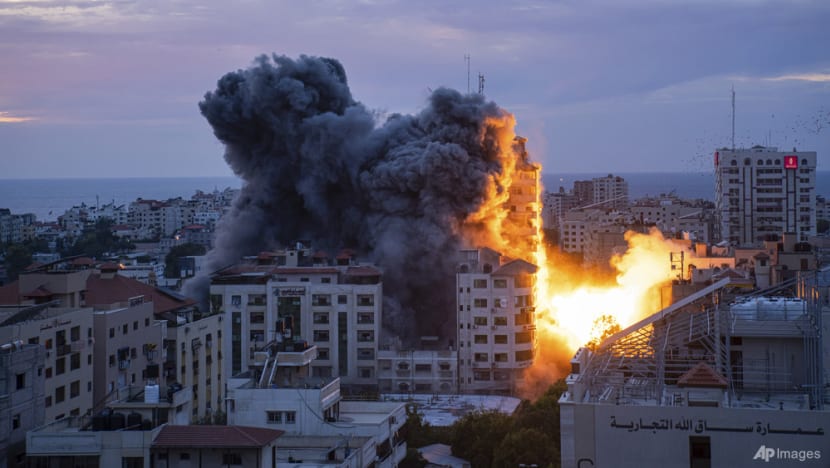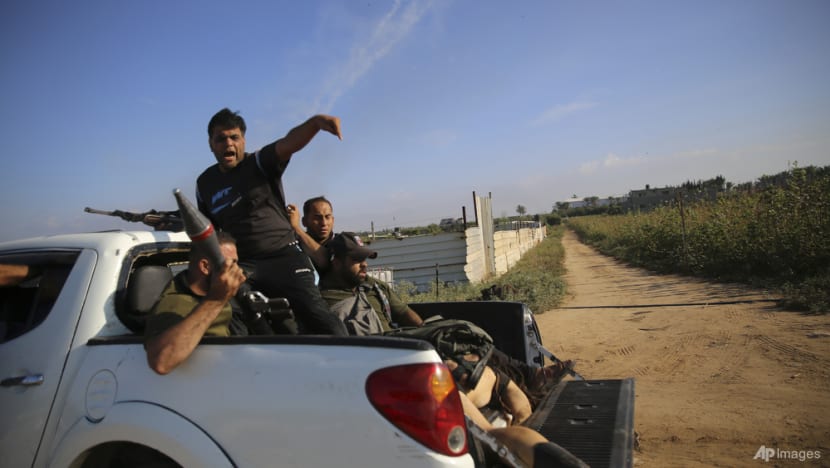Permanent buffer zone in north, Palestinian Authority in power: Questions remain over Israel’s Gaza plans, say experts
It has been a month since Hamas infiltrated and struck targets in Israel, killing some 1,400 people and seizing more than 240 hostages. Israel responded by laying siege to the Gaza Strip, with the operation continuing to this day.


This audio is generated by an AI tool.
A month after the war between Israel and Hamas in the Gaza Strip erupted, constant Israeli bombardments continue but there remains no clear endgame in sight, said experts.
Israel is expected to persist with its strikes on Gaza despite international outcry, said Dr Bernd Kaussler, professor of political science at James Madison University.
Its plans for Gaza remain unclear, such as whether it will try to have a like-minded Palestinian leader there after removing Hamas, or create a permanent buffer zone in north Gaza by driving the entire population south.
On Oct 7, Hamas infiltrated and struck targets in Israel, killing some 1,400 people and seizing more than 240 hostages.
Israel responded by laying siege to the Gaza Strip, with the operation continuing to this day. More than 10,000 people have been killed in Israel’s strikes, according to the territory’s Hamas-controlled health ministry.
Questions have also been raised over the Israeli security and intelligence lapses that allowed for the initial Hamas attacks to occur, with public pressure mounting on Prime Minister Benjamin Netanyahu.
Dr James Dorsey, adjunct senior fellow at the S Rajaratnam School of International Studies, said that based on historical precedence, his days in office “are numbered”.
ISRAELI STRATEGY FROM HEREON
Dr Kaussler told CNA’s Asia First on Tuesday (Nov 7) that the Israeli government now has two choices in the war moving forward.
“It can continue indefinitely with shelling and incursions using the tanks and everything at its disposal, which of course is a rather sophisticated military machine. Or it can say, ‘The revenge we've done is enough. We've liquidated most of the infrastructure in Gaza and we can declare victory’,” he said.
However, that could leave Hamas to claim it has emerged victorious in the conflict, after bringing Israel to its knees and emerging alive, said Dr Kaussler.
It is hence more likely that Israel will continue striking Gaza regardless of international outcry, with actions that “amount to human rights, war crimes, and violations of international humanitarian law”, said Dr Kaussler.
Dr Dorsey told CNA’s Asia First on Tuesday that the initial Hamas attack succeeded for three reasons.
Firstly, Israel has assumed that the status quo arrangement in the region was sustainable and that there would not be some sort of outburst, he said.
The Israelis also underestimated the capabilities of Hamas.
“The third failure was that the focus was on the West Bank, where you had a burgeoning armed resistance. And that was what posed, at that moment, the foremost threat as far as the Israelis were concerned,” said Dr Dorsey.
He said it remains unclear what Israel’s end goal in the war is, noting that it has moved to divide the Gaza Strip into two separate portions.

“Clearly, they believe that the main structures of Hamas are in the north of Gaza, and that's one reason to cut it off,” he said.
“What they want to do with the north is again unclear. Do they want to create that into a permanent buffer zone and push the Palestinian population of Gaza in its total towards the south?”
REGIONAL NEIGHBOURS AND THE US
Israel’s regional neighbours, namely Jordan and Egypt, are also uneasy about the conflict spilling over into their countries as it could be hugely destabilising for them, said Dr Kaussler.
“They have, of course, primary humanitarian objectives to all Palestinians, but they are also very concerned about what it could mean for their own security,” he said.
He said that it is ultimately up to the United States to demand a ceasefire in the war, though that “by all accounts, is not happening”.
Dr Kaussler said that US Secretary of State Antony Blinken has made a trip to the region to avoid a further destabilisation of the situation, but noted that the Israelis are not agreeing to a ceasefire.
“Probably only the United States government has the power to pressure the Israelis, and that happened before,” he noted.
In 1982, former US President Ronald Reagan forced then-Israeli Prime Minister Menachem Begin to stop the shelling of Beirut, the capital of Lebanon, while in 2006, President George W Bush forced the Israelis to withdraw from Gaza.
“There's a lot of power American presidents have because of that special relationship the US has with Israel. But so far it's not happening,” said Dr Kaussler.
PALESTINIAN POWER VACUUM
There also remains uncertainty over the power vacuum that would ensue within the Gaza Strip if Hamas is removed, since the group has been in power there since 2007.
“The Israelis could continue with the campaign and destroy Hamas, and something far worse than Hamas could emerge out of the ashes of Gaza,” said Dr Kaussler.

He noted that while the Palestinian Authority (PA) is internationally recognised as the legitimate representatives of Palestinians, and should at some point become the government of a sovereign Palestinian country, it may lead to further conflict if it assumes power.
“For them to govern Gaza might amount to a civil war between the PA and other factions in Hamas. The Israelis could maybe install like-minded Palestinian leaders to govern Gaza if Hamas were to be destroyed,” said Dr Kaussler, adding that it is an unlikely scenario.
Dr Dorsey noted that Hamas popularity is increasing on the West Bank.
“The West Bank is ruled by an inefficient, corrupt administration. Palestinians have long been frustrated with the fact that they have not delivered on public goods, or for that matter on a peace settlement or some sort of settlement with Israel, which is the reason why you had a burgeoning armed resistance on the West Bank,” he said.
He said that while the popularity of Hamas in Gaza was low prior to the war, only time will tell whether a degree of resentment and bitterness among the population from the war has changed things.
Dr Dorsey added that based on every major war that was ever fought, including the 1973 Yom Kippur War and the 1982 invasion of Lebanon, Israeli governments have by and large not survived longer than six months after.
He noted that Prime Minister Netanyahu is widely held by the Israeli public as having been responsible for the intelligence and military failure which led to the Oct 7 attacks.
“He has so far refused to take that responsibility and sort of tried to push it off on the military, on the reservists (and) on the intelligence,” said Dr Dorsey.
“But once the fighting ends, you get into an investigation into what happened, as you've had after other Israeli wars, and at that point, Benjamin Netanyahu's days are numbered.”














